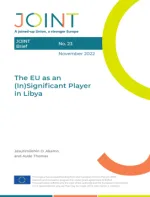The EU as an (In)Significant Player in Libya

JOINT Brief No. 23 (November 2022)
Factors that limit the EU’s effectiveness in promoting the Libyan peace process can be categorised into three streams: damage control approach, soft power approach and EU internal divisions.1 To a convincing extent, these factors explain why the EU cannot be considered a significant player in the Libyan peace process. However, there are alternative means through which the EU can enhance its Libya policy without switching to a hard power approach, which may impede the ongoing UNled peace process and constitute violation of its norm.
The damage control approach refers to a type of response that is limited to mitigating the impact of a crisis. Migration is one of the effects of the Libya crisis on Europe. Migrants move from and through Libya into the EU because of conflicts and socioeconomic hardship in their respective home countries.2 As migration flows fuel political divisions in most EU countries, EU governments tend to look at the conflict in Libya through the migration lens.
References:
1- Institute for Peace and Security Studies (IPSS), Roundtable: Post-Election Libya and the European Union, JOINT virtual roundtable, 23 February 2022, https://ipss-addis.org/?p=11816. The roundtable brought together experts and researchers on the Middle East and North Africa (MENA) region, as well as a former diplomat Libya.
2- Mattia Toaldo, “Migrations Through and From Libya: A Mediterranean Challenge”, in IAI Working Papers, No. 15|14 (May 2015), https://www.iai.it/en/node/4183.